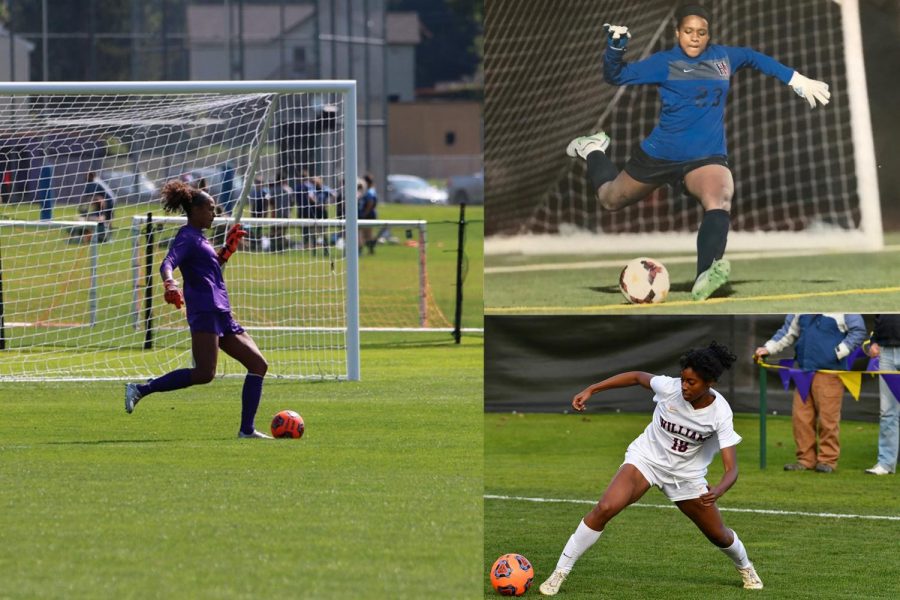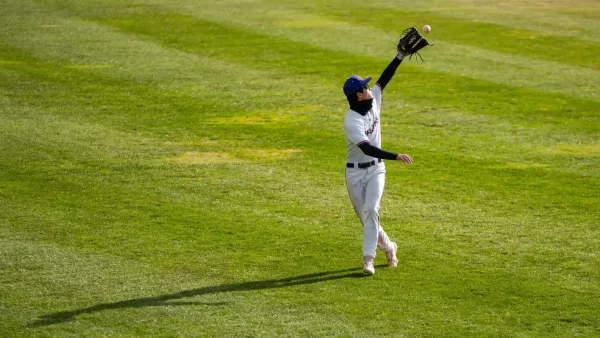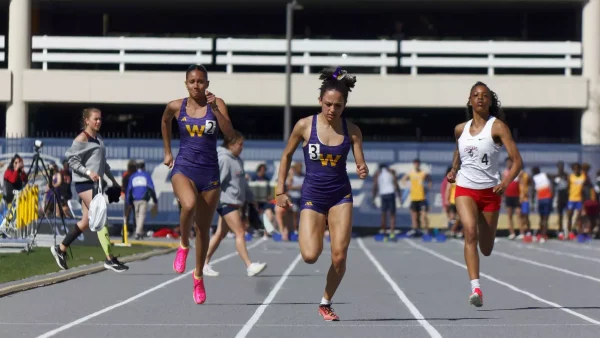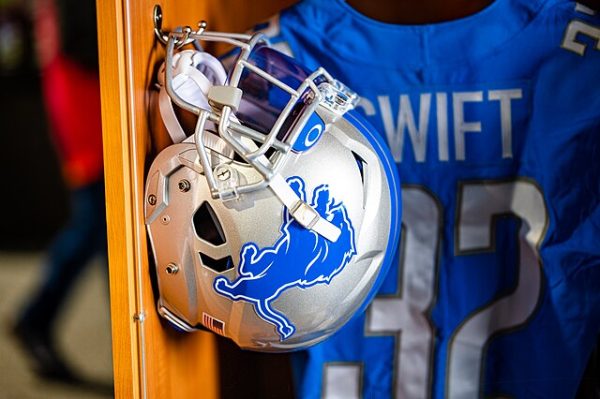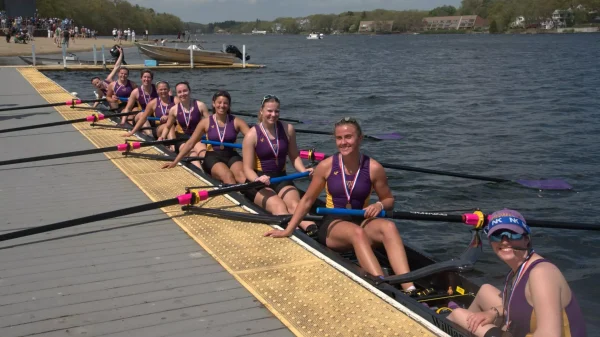Navigating ‘white structures and white expectations’: Black athletes discuss race, belonging on women’s soccer
Whitney Lincoln ’20 (left), Lindsay Avant ’21 (top right), and Sydney Jones ’21 (bottom right) spoke with the Record about their experiences as Black athletes on women’s soccer. (Photos courtesy of Grace Byers, Lindsay Avant, and Kris Dufour.)
Beginning when she was 12, Sydney Jones ’21 straightened her hair using chemical relaxers. During soccer practice, she noticed that her hair didn’t look like the other girls’.
“I just wanted to have my hair look like the other girls’ hair,” Jones said. “I wanted to not have to worry about my hair if it rained during practice, or if I needed to rinse it out because of sweat. I wanted to go home, take a shower, wash my hair, and wake up the next day and have it be perfect. But that wasn’t my hair.”
Six years later, she was beginning her soccer career at Williams. “Imagine it being the first day of college,” she said. “You have practice at 5 p.m. and you’re going to be at practice from five to seven. And imagine spending time doing your hair, making sure you look nice because you want to make a good impression on people, and you want to make friends.”
And then your hair gets messed up at practice, and you’re in a locker room “where you know your hair is different and you’re hoping that you won’t have to explain why your hair was straight before practice and why it’s poofy now,” she continued.
Jones added that it’s important to feel confident in one’s appearance on the first day of college. “But for me, it was just a really stressful experience,” she said.
Most importantly for Jones, wearing her natural hair is an act of resistance, particularly given the history of “policing and regulating Black hair in sports and academic spaces.”
Sarah Hollinger ’19, a Black player who was captain of the women’s soccer team during her senior year at the College, had several conversations with Black players about their experiences on the team. Those players “felt race as impacting their experience on the team for reasons both localized and for reasons that are the symptom of being at a PWI [predominantly white institution] as an athlete,” she said.
The Record spoke with three Black players on women’s soccer — Jones, Lindsay Avant ’21, Whitney Lincoln ’20 — who took significant time off from the team over the last two years or, in one case, quit the team outright. They all emphasized that their experiences on the team were symptomatic of it being part of a PWI, of “having to navigate through white structures and white expectations,” as Jones put it. To varying degrees, players said they faced racist stereotypes, being undervalued by a member of the coaching staff, and a lack of support from the athletic department. All of the players, though, noted that their experiences on the team were ultimately positive when it came to interactions with their teammates.
Deciding whether to leave
Studying away at Columbia University had always appealed to Jones. She wanted to be in New York City, and Columbia offered renowned academic programs in areas of interest. “It wasn’t ‘I’m quitting the team’ until I got to New York City and realized what my life was without it,” she said. “I just felt more free.”
It is not true to say that being on the soccer team was difficult just because she is Black, Jones said. It was primarily because she was falling out of love with the game, and because she wanted to focus more on her schoolwork. Even so, “[for] a lot of people at Williams, this is their first time interacting with Black people,” Jones said. “You can tell, to say the least. It’s no fault of their own. It’s just where they grew up.”
Jones did not rejoin the team when she returned to Williams — albeit remotely — her senior year.
Avant said she decided to spend her junior year in France in part because of frustrating experiences on the team. “Looking back, I didn’t get treated like the other players on the team,” she said. “It makes you wonder if the reason was because I’m Black. It just makes you question.”
Like Jones, when Avant decided to go abroad for her entire junior year, she hadn’t yet decided whether to formally quit the team or rejoin once she returned to the College.
Early last spring, Sarah Raymond, who was an assistant coach at the time but is now the head coach, called Avant and asked if she wanted to rejoin the team. Avant agreed, and said she enjoyed being on the team last fall, even though the season was cancelled.
Lincoln was the only one of the three athletes who quit outright. Lincoln said she felt marginalized by a member of the coaching staff, who has since left the College, during her four years on the team.
“There were times when I was made to feel as if my contributions to the team didn’t matter, and I felt invisible,” Lincoln said.
‘Athletic but not technical’
Several Black players on the team cited the language a coach used as a component of what made them feel uncomfortable, particularly the term “athletic but not technical.” Some said it was indicative of the coach’s broader attitude, which undervalued their skills.
“The term athletic [but] not technical was a phrase that a member of the coaching staff used more than once to describe me and some other team members” on the second string, Jones said. The starting team the coach described as “technical” and able to play well off of one another, while the second string, which would sub in for the starting lineup at strategic points throughout a game, was deemed more “athletic.”
According to Jones, there were noticeably more players of color on the second string team. Hollinger and Nkem Iregbulem ’20, another Black player on the team, agreed with this assessment, though Hollinger noted that there were very few players of color on the team to begin with, so it was hard to tell. She added that people also moved back and forth between the starting lineup and the second string. Georgia Lord ’22, an Asian American player on the team, said she thinks the number of players of color on the starting lineup and second string are currently about even.
Perhaps serving as an explanation for this asymmetry, Jones said that the term “athletic but not technical” is racist.
“When you contextualize it in history in the United States, it has usually been a statement that is a part of a very racist tradition involving Black athletes in particular — the idea that Black athletes are naturally more athletic and have a greater ability for sports, and it comes easily to them, but they’re not technically trained,” Jones said. “Or they lack the kind of technical ability to truly excel in the sports that they engage in.”
“This is something that has been said about Serena and Venus Williams. This is something that’s been said about Surya Bonaly,” she continued. “This is something that’s been said about many exceptional, notable Black athletes.”
Jones said that the member of the coaching staff calling her “athletic but not technical” aligned with this racist history. An all-American and the lead goal scorer on the team, Jones wondered why she did not qualify as a technical player.
Hollinger, who was captain of the team during Jones’ sophomore year, said she witnessed the coach suggest that Jones was “athletic but not technical,” making comments like “I want you to really use your athleticism.”
When Hollinger heard it, she said it didn’t sit well with her, though she added that she is not sure whether the coach would only say things like this to Black players. “[The coach] definitely did say it to Black players on the team,” Hollinger said. “I can’t speak to [them] not saying it to other players on the team.”
Double standards and being undervalued
Part of the reason Avant decided to go to France was because she felt “frustrated” with her experience on the team freshman and sophomore year. Avant is also a French major, and Paris offered more diversity — for example, unlike Williamstown, the city has hairdressers for Black hair.
“I remember going to some study away meeting sophomore year, and they were like, ‘If you can go academically full year, we recommend you do.’ So I was like, ‘Why not? I don’t really have anything keeping me here,’” she said. “Nothing at Williams made me want to stay.” Avant’s dedication to the team went unrecognized, according to Jones. “I felt that Lindsay was underappreciated, and I think that she was not invested in,” she said.
Iregbulem pointed to a “double standard” members of the coaching staff had for fast players as compared to players who were seen as less fast.
“I’m super fast, and when I couldn’t get to a ball as a defender, it was interpreted as ‘You’re not trying’ versus when other fast people would look super tired on the field and not be able to get to a ball, it would be interpreted as ‘Oh they’re just tired,’” Iregbulem said.
Iregbulem said that Jones’ speed “was used as a weapon against her.” It seemed to Iregbulem that Jones was expected to “run around continuously for minutes on end getting whatever ball — no matter whether it was a good pass or a bad pass.”
Iregbulem noted that, among fast players, only she and Jones were subject to such high expectations. Members of the coaching staff seemed to understand that other players slowed down because they were tired and needed a break. In trying to understand why she and Jones experienced this double standard, Iregbulem said she didn’t want to assume intention, but that “it’s not crazy to suggest that [race] is a possibility.”
Her senior year, Iregbulem said she approached a member of the coaching staff about the double standard for really fast players. Iregbulem said the coach took her comments into consideration, and that she noticed an improvement in the coach’s behavior. Jones said she also had a conversation with the same coach. In her case, she wanted to inform the coach about the racialized origin of the idea of a Black player as “athletic but not technical.” Jones said the coach apologized, and did not do it again.
For Jones, the ubiquity of microaggressions makes them difficult to contend with. Because they are so common, it is sometimes hard to identify them or react to them in the moment.
“A microaggression, to me, is sometimes more dangerous than overt racism just because it’s harder to address and it’s harder to pinpoint,” Jones said. “If you try and talk about it [to] someone who is outside of your race or outside of your experiences, it’s hard for them to see what you mean. But it still exists.”
Microaggressions are baked into American society, according to Jones, which is another reason why they are so difficult to identify and easy to dismiss. She emphasized that the team was not a “center” of microaggressions, but rather just another element of a PWI.
Though they are painful, Jones said she has learned how to deal with them. “I don’t let it get to me, not anymore,” she said. “It’s just something that kind of pops up, and it’s like, ‘That was annoying, that was a microaggression’ — but you move on.”
Belonging on the team and at Williams
In sophomore year, Jones said she started transitioning to her natural or “virgin” hair. People asked questions that she didn’t really want to answer. “Someone was like, ‘Do you wash your hair?’ And I was like, ‘obviously,’” Jones recalled.
Jones felt that the questions were well-intentioned, but still challenging to deal with. “They weren’t trying to make me feel othered,” she said. “They were really just curious about me, and they wanted to know me, and they wanted to know my hair… Sometimes I was just like, ‘Wow, wouldn’t it be nice for someone to just understand.’”
Like Jones, Avant said that she also heard many questions and comments about her hair, and that these comments are common for most Black students at the College. Two incidents in particular stick out in her mind.
“I remember sophomore year I came back to campus — I had a different hairstyle than I did freshman year, and so many different people didn’t recognize me, and there’s not really a big difference [between the hairstyles],” Avant said. “I do recall freshman year, too, there was another player who had the same hairstyle as me who was Black on the team and sometimes parents would call me her name, which obviously sucked.”
Hollinger said she was “hyper aware” of the fact that her experiences were different from that of non-Black players, but people did not ask her questions in the way they asked Jones.
“I was definitely conscious of it,” Hollinger said. “You’re on a majority white team and everyone has a similar process for dealing with their hair, which is not similar to Black women, who have very unique — depending on who they are — processes for managing their hair… I didn’t feel insecurity about it. I was like, ‘I know I handle my hair differently than the majority of the team.’”
Hollinger noted that, because she has attended PWIs for her entire life, she might be less sensitive to microaggressions than other Black players on the team. But that doesn’t make those experiences any less damaging for those players. “I’m able to brush things off — and probably ignore things that I shouldn’t ignore — in a way that’s allowed me to stay on the team for four years,” Hollinger said.
Jones can recall two other instances when her teammates asked her about her hair. Once, she was in the bathroom with a white teammate, and the teammate asked if she could touch Jones’ hair, which was in an afro at the time. “And then we just kind of looked at each other for a second, and she was like, ‘Oh, um, nevermind, nevermind,’ as if she remembered that it might be awkward for me,” Jones said. She noted that she and the teammate have a “good relationship.”
Another time, a white teammate asked Jones if she could wear an afro as part of her Halloween costume to a party on Hoxsey St.
“She was asking me for my permission, essentially,” Jones said. “I wish I could just say to her [that] me being okay with something doesn’t mean that all Black people are okay with it… I think I remember saying something like, ‘If you have to ask, it’s probably not something you should do.’”
In those kinds of situations, Jones said she felt she has to be understanding, and aware of both perspectives — her own, and that of her white teammates.
“I can’t get annoyed, mad, or frustrated or upset because they really are coming from a good place, but sometimes it’s tough because even though it’s coming from a good place, it still is burdensome, and it’s still frustrating and it’s still upsetting,” Jones said. “Constantly having to be the teacher, the healer and the bigger person is a lot sometimes.”
But Jones said she never felt “unappreciated” or “overlooked.” She emphasized that these questions came from a place of curiosity — a desire to understand rather than isolate or alienate. After years of playing soccer in high school and earlier, it felt like the first time in her soccer career that teammates were attempting to understand her.
Lincoln was a backup goalie her freshman, sophomore, and junior years, and her senior year she started until she broke her hand. She said support from the former head coach during her four years on the team felt “conditional.”
She was so committed to the team that after she broke her hand, she finished the game she was playing and went on to play the next. And yet, after her injury, she did not receive any support from the coach. She said it made her feel invisible.
“As a Black student at Williams, a predominantly white institution, there were times where I felt marginalized,” Lincoln said. “After nearly four years of dedication and commitment to the team, to be further marginalized in that space after my injury was especially disappointing.”
She said she understood the level of commitment necessary to be on the team at Williams, and the “amazing” results that could produce, but the fact that she felt invisible, marginalized, and undervalued did not make it worth it anymore. She said the conduct of her coach overwhelmed the positive relationships she had with her teammates, and that she felt her commitment was not reciprocated.
“My teammates were like a second family to me, a home away from home. So it was obviously a very difficult decision, but ultimately one that was necessary for my well-being,” Lincoln said.
Partly because she didn’t want to be disruptive to her teammates, and partly because she didn’t yet have the language to explain her decision, Lincoln chose not to tell her teammates the day she quit the team. “One of the most difficult things was the fact that [it] happened a couple of hours before an important game,” Lincoln said. “The timing was very difficult for my teammates to understand.”
But Lincoln emphasized that her decision was based on years of feeling invisible—both on and off the team. “The decision didn’t come entirely out of the blue, but was a culmination of four years of constantly questioning my commitment to the team and intentionally minimizing my contributions,” she said.
For white students who might have felt invisible on the team, she said, they had a chance to feel visible when they weren’t at practices or at games. What made Lincoln’s experience so hard was the fact that, even when she left the team environment and entered the wider College community, she would still at times feel invisible. Feeling marginalized on the team “compounded” with the experience of being Black at a PWI.
“Oftentimes it’s difficult for non-Black players to understand the extra weight you’re carrying on your shoulders when you’re at practice,” Lincoln said.
Insufficient institutional support
Lincoln said she noticed that, while she was at the College, many of her BIPOC friends took time off.
“There’s a disproportionate number of minority students that are either requested or forced to make the decision to take time off,” she said. “A lot of those students who were deciding to do that were friends that I had made [at the] beginning of my time here.”
For academic, or mental health reasons, “the … amount of support needed for those students wasn’t there,” Lincoln added, though she noted that she has seen strides to improve that. IWS has brought on a few therapists of color, for example.
Jones said that the problems she encountered did not stem from her team members. They were very supportive, and tried to make her comfortable. She did sense a lack of guidance from higher-ups at the staff and administrative level, as well as underrepresentation of people of color on the team and in the athletics department.
Lincoln and Avant agreed with this characterization. Neither of them felt there were enough staff of color in the athletics department during their time on the team. Avant noted, though, that since her sophomore year more BIPOC administrators have joined the athletics department. In particular, Tommy Verdell, the Athletic Director of Inclusion and Compliance, was hired in June of 2019.
Even so, departmental support for BIPOC students is still insufficient, according to Avant.
“There’s rarely a coach that’s not white,” Avant said. “There’s no one I would really feel comfortable talking to in the athletic department about being Black at Williams.” Since last summer, Avant emphasized that the department has been working toward becoming more inclusive for athletes of color. She said she would feel comfortable talking to her current coach, Sarah Raymond, about race.
“I’m hopeful that one day it can be the case that students who are athletes of color can come here and feel like they can hold all of their identities in one space, and they’re not having to pick and choose when to give up certain components of their identity,” Lincoln said.
The path forward
Avant, who rejoined the team after returning from France, said that the team had a number of meetings related to race last summer after the murder of George Floyd. The team also formed a diversity, equity and inclusion (DEI) committee, which had its first meeting in early February of this year.
During a regular team meeting the weekend after George Floyd was killed, the team’s new coach, Sarah Raymond, brought it up. She contacted Verdell and Drea Finley, the College’s new dialogue coordinator, and Finley led regular team meetings related to race and social justice over the course of the summer.
“We have talked about how athletics in general at Williams doesn’t necessarily foster a great environment for Black athletes and doesn’t always have a great image in the larger Black community at Williams,” Avant said, adding that Williams as a whole is not a comfortable environment for Black students.
During the meetings, Avant said some of her teammates said hurtful things. “People will say hurtful things when they’re learning,” Avant said. “I’ve done that too, so I don’t blame this person for that because we all start somewhere and we make strides from there.”
Avant emphasized that she doesn’t want people to not have these conversations out of the fear of saying the wrong thing, since they were ultimately a step in the right direction. “I don’t say the right things all the time, so I don’t expect others to say the right things right away,” she said. “Everyone has a different starting point.”
Lincoln said that, though she is not sure what the athletic department has done since she graduated, she hopes that it will require conversations about diversity across all teams. In particular, it would be helpful to “have an intentional conversation at the beginning of each season similar to the hazing and alcohol discussions [and] presentations that are mandatory for all athletic teams,” she said. “Having one on diversity would be equally as fundamental to the overall positive experience of athletes.”
“Sometimes it’s just assumed that everybody is made to feel included,” she added.
Lisa Melendy, the director of the athletics department, wrote in an email to the Record that “this past winter, the entire department participated in the 21-Day Allyship Challenge designed to build more empathy and understanding as we strive to support all of our colleagues and students.” She wrote that this was “just one example of the work department has done in the DEI space.”
In the spring of 2021, the athletic department hired Dominic Oduro, assistant coach for men’s and women’s soccer. According to Melendy, funding for Oduro’s hire is from a grant “which, over the next two years, will support an additional coach of color working with both the men’s and women’s soccer teams.” Oduro also worked with the teams this fall.
Lord said the DEI committee meetings this spring have been productive. Some changes the committee has instituted include monthly meetings, and, going forward, students of a certain class years will be tasked with developing some sort of DEI activity each season. Each year, the team will choose a theme, and all activities for that year will center on that theme.
In part because she’s a senior now, Avant said that this fall, for the first time, she had fun being on the team. The team is also fully living up to one of its principles in a way that makes her comfortable discussing race.
“One thing on the team is open, honest, and direct communication which I personally don’t think people always did, but I think that at least I feel like I can actually speak my mind about things this year where I did not feel like that before,” Avant said.
She said the team can address race in a way it couldn’t in the past. The Class of 2024 is “really diverse,” and Avant said the team can honestly address the question, “What can we do to make sure that they stay on the team all four years and have a good experience?”
Raymond asked Jones if she wanted to join these conversations over the summer, and Jones said yes. She was interested in participating, and wanted to keep her options open because she wasn’t sure if she was going to be remote or in-person in the fall. But by mid-summer, she had decided she probably wasn’t going to play soccer and would attend Williams remotely. Once the school year began, she stopped participating in remote meetings with the team entirely.
As this chapter of her life comes to a close, Jones said she is proud of her soccer career.
“I would always think back to my younger self going to those practices and getting home at nine o’clock at night and having to do homework, or having to deal with the racial dynamics on my past soccer teams, and having to be a little Black girl on an all white soccer team, and being objectified for my natural athleticism,” which overshadowed her technical abilities, Jones said. “It was great being able to bring all of myself to the team and have that be accepted.”
Jacob Posner ’23 is a history major from Chicago, Ill. He is an executive editor for podcast and previously served as a section editor for features.
Email:...



